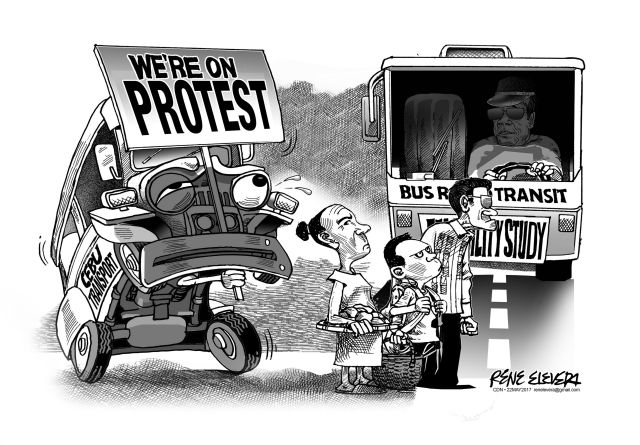
Today’s scheduled transport strike by a militant leftist transport group comes not coincidentally on the heels of an ongoing public consultation over the looming Bus Rapid Transit (BRT) project to be implemented in Cebu City.
The timing may or may not have been suspect; but Cebu-based transport groups such as the Cebu Integrated Transport Cooperative (Citrasco), the biggest in Metro Cebu, have long known and accepted the reality of the BRT and lobbied to have affected drivers absorbed into the project.
Today’s transport strike is a rehash of the long-ventilated fears of an order that remains in paper to require jeepney operators to modernize their units or else face the cancellation of their franchise if they continue to operate their aging, decrepit vehicles.
Commuters in Metro Cebu may be unhappy — the transport strike coming as it is on Monday, the start of the work week — but they know the drill: wait patiently until buses contracted by the local governments come and fetch them at their designated stops.
In the meantime, they may either pay for a taxi ride hailed courtesy of some transport network service or talk with friends with cars for a carpool experience that can turn out to be quite fun and memorable.
At any rate, the transport strike will be staged by the militant leftist transport group Pagkakaisa ng Samahan ng mga Tsuper at Opereytor Nationwide (Piston), whose relentless adamant position against the phaseout of aging jeepney units runs counter to growing public sentiment for better transport choices.
So how is today’s transport strike related to the ongoing BRT talks? Simply put, the BRT, which is still a good two to three years away if things proceed as planned by the city, will confine jeepney drivers to missionary feeder routes that lead to the BRT which will become the primary mass transport system of choice in the city.
Add to that the requirement to phase out aging jeepney units; and both drivers and the jeepney operators who continue to operate these vehicles have a very real fear of not only being driven out of business but being rendered at best a secondary option for commuters with meager budgets, and at worst, completely losing their market to the taxis, the private motorists contracted under Uber or Grab Taxi and yes, the BRT.
But they have little to fear as the Cebu City government said it will build a center to help jeepney operators repair their units to ensure that they can continue to operate perhaps even beyond its intended lifespan.
In the meantime, the jeepney drivers and operators will have a hard time convincing a skeptical public to support their cause against the phaseout of aging jeepneys especially in light of the promise of better units on the road and a more sensible mass transport system being set up in place.

